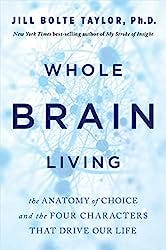Whole Brain Living
This is a podcast that could change your life. It’s changed mine.
At 37 years old, Jill Bolte Taylor was on the fast track as a Harvard brain researcher. Until one morning, a stroke consumed the left side of her brain, leaving her alive but unable to function in a meaningful way. The bleed that consumed the left side of her brain meant that she was existing in her right brain, without any memory or executive functioning abilities. But what she experienced and learned, was the amazing and boundless sense of creativity and being in her right brain. And as a brain researcher, she understood the implications of her experience.
Jill writes about the insights she gained in her new book Whole Brain Living and provides a step by step guidance to how we can use her knowledge to better our lives and mental health. This book is game changing.
You can listen to the main podcast here.
In the second part of our conversation, we also explore the use of psychedelics for brain health; mental health in children; and more. This is just for Bump II Subscribers. But you can get a sneak peak by signing up with the code FREEMONTH to check it out.
I had a significant experience using Jill’s methodologies which I shared in a recent Side Trip. Side Trips are ultra short podcasts about the off road excursions we take that often lead to interesting life experiences. In this Side Trip, I shared my experience using Dr. Taylor’s methodologies.
I suggest you listen to the podcast first because Dr. Taylor provides a detailed discussion of the various parts of our brain and how they are used. With that knowledge, see if you can relate to my experience.






Whoa!
Hello Pat.
Several years ago while I was teaching Comparative Culture classes in Japanese colleges, I came upon Jill's TED talk "My Stroke of Insight". I was not prepared for what I was to see, and found myself in tears at the end of her talk. Shortly afterwards, I found her e-mail and sent a note asking permission for Japanese college students to translate the talk. Without my knowing how much impact she had already made, she wrote a good-natured reply thanking me and informing me the talk as well as her book had already been translated. We exchanged a couple more short mails (which I have cherished and saved), and shortly afterwards, NHK-E (educational TV in Japan), aired two documentaries about her. As I suspected, and as emerged in my classes, Jill's understanding of her experience has much in common with some traditional Japanese values, particularly some Zen influenced art and psychology, Shintoism, and Taoist counterparts.
I have not yet read this book, but thanks to the heads up in this substack post, I just bought the Kindle version. Looking forward to it.
Regards from Japan,
steve